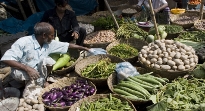What is the Multilateral System?

Global efforts to conserve and sustainably use plant genetic resources for food and agriculture to ensure food security and promote sustainable agriculture worldwide depend on the continued open exchange of these resources. There is a need for crop accessions to be available in a clearly defined yet unbureaucratic manner, so that farmers, plant breeders and researchers can continue to contribute to global food security.
Providing easy or routine access to crops has thus become one of the core elements of the Multilateral System of the International Treaty as an effective, efficient and transparent system for exchanging plant genetic resources for food and agriculture (PGRFA).
The Multilateral System is the International Treaty's truly innovative solution to access and benefit-sharing. It includes 64 of the world’s most important crops. These are crops that together account for 80 percent of all human consumption derived from plants. On joining the International Treaty, countries agree to make their genetic diversity and related information about the crops stored in their public gene banks available to all through the Multilateral System (MLS). Other holders have declared additional materials available. In 2018, this comprised a pool of genetic resources of 2.5 million accessions accessible to all users
This mechanism offers scientific institutions, farmers, plant breeders and the private sector the opportunity to work with, and potentially improve, the materials stored in gene banks or used in breeding programmes. By facilitating research, innovation and the exchange of information without restrictions through its Global Information System, the International Treaty cuts down on the costly and time-consuming need for breeders to negotiate contracts with individual gene banks. By September 2021, users of the Multilateral System had received more than 6,1 million materials for research, training and breeding.
The Multilateral System provides opportunities for both developing and developed countries that share technical know-how to use their materials and laboratories to build on what farmers have accomplished in their fields.
Facilitated access to genetic material available in gene banks or as part of a research programme is made available through a standard contract, the Standard Material Transfer Agreement (SMTA). The material may include collections of local seeds kept in small refrigeration units of research laboratories, national seed collections housed in government ministries, or research centre collections that contain all known varieties of a crop from around the world.
Under the International Treaty's MLS, collections of local, national and international gene banks that are in the public domain and under the direct control of Contracting Parties share a set of efficient rules of facilitated access for the established purposes, and with the exclusion of industrial or pharmaceutical applications. The System includes the vast collections of CGIAR.

